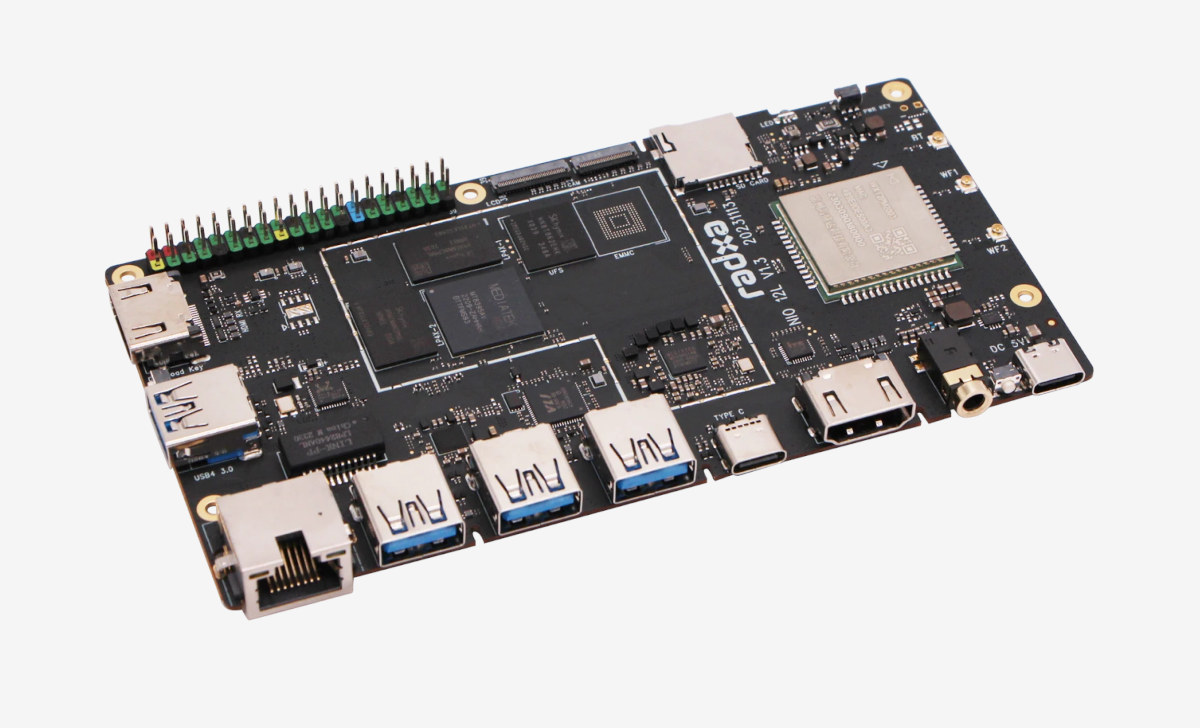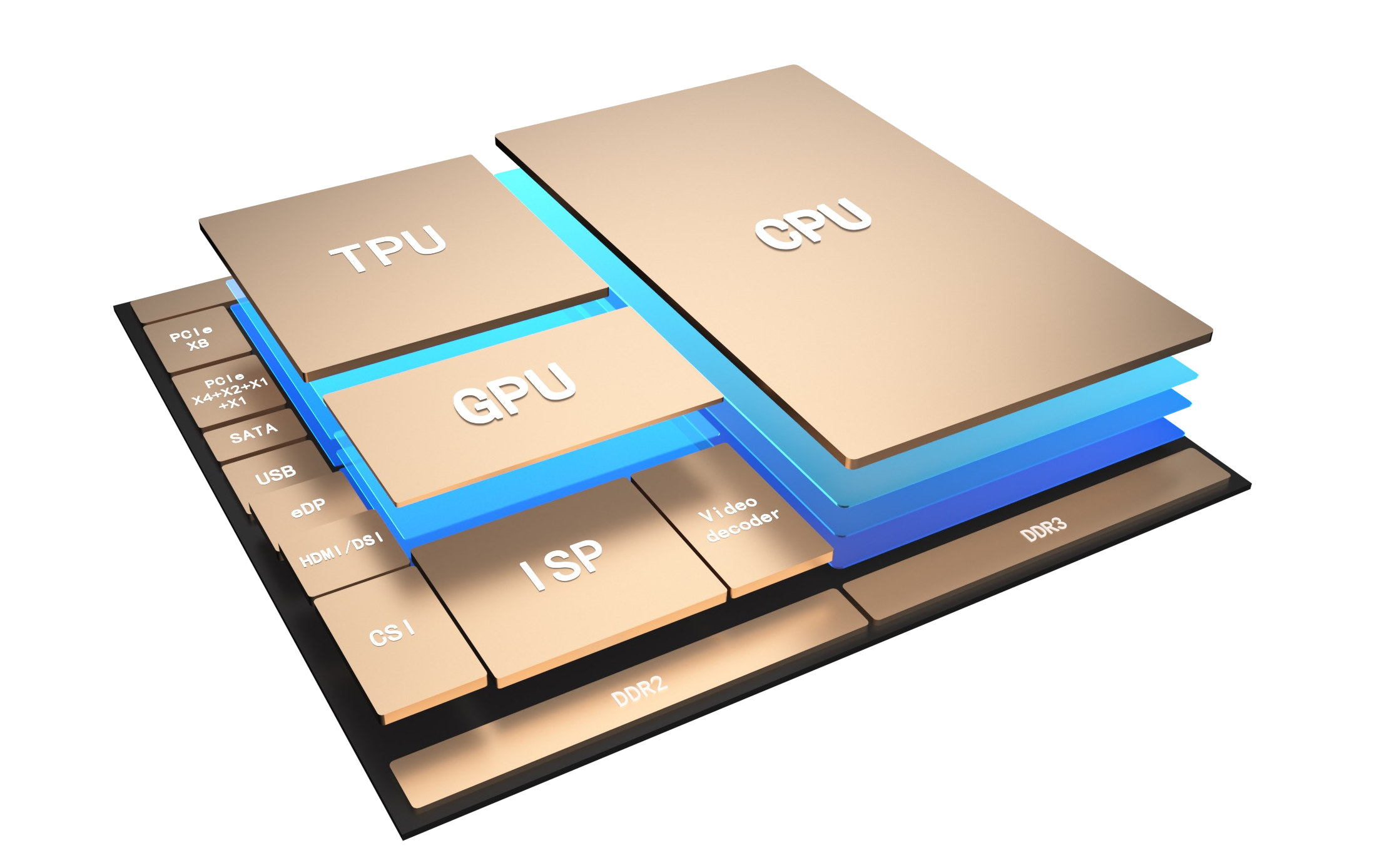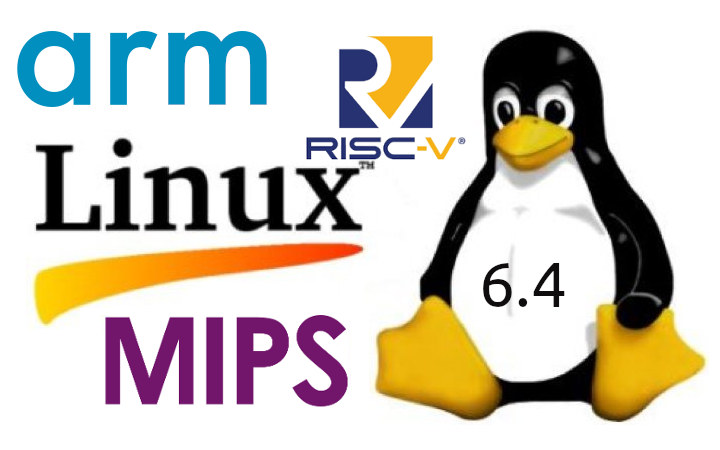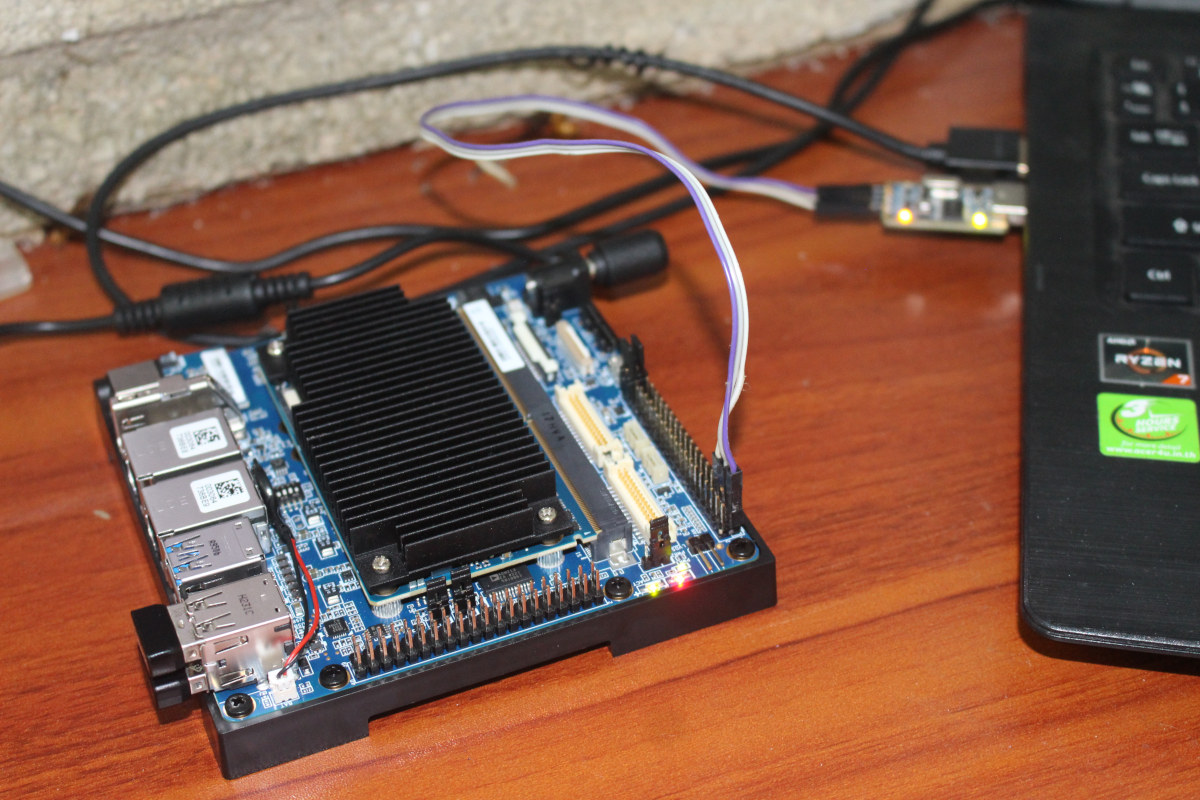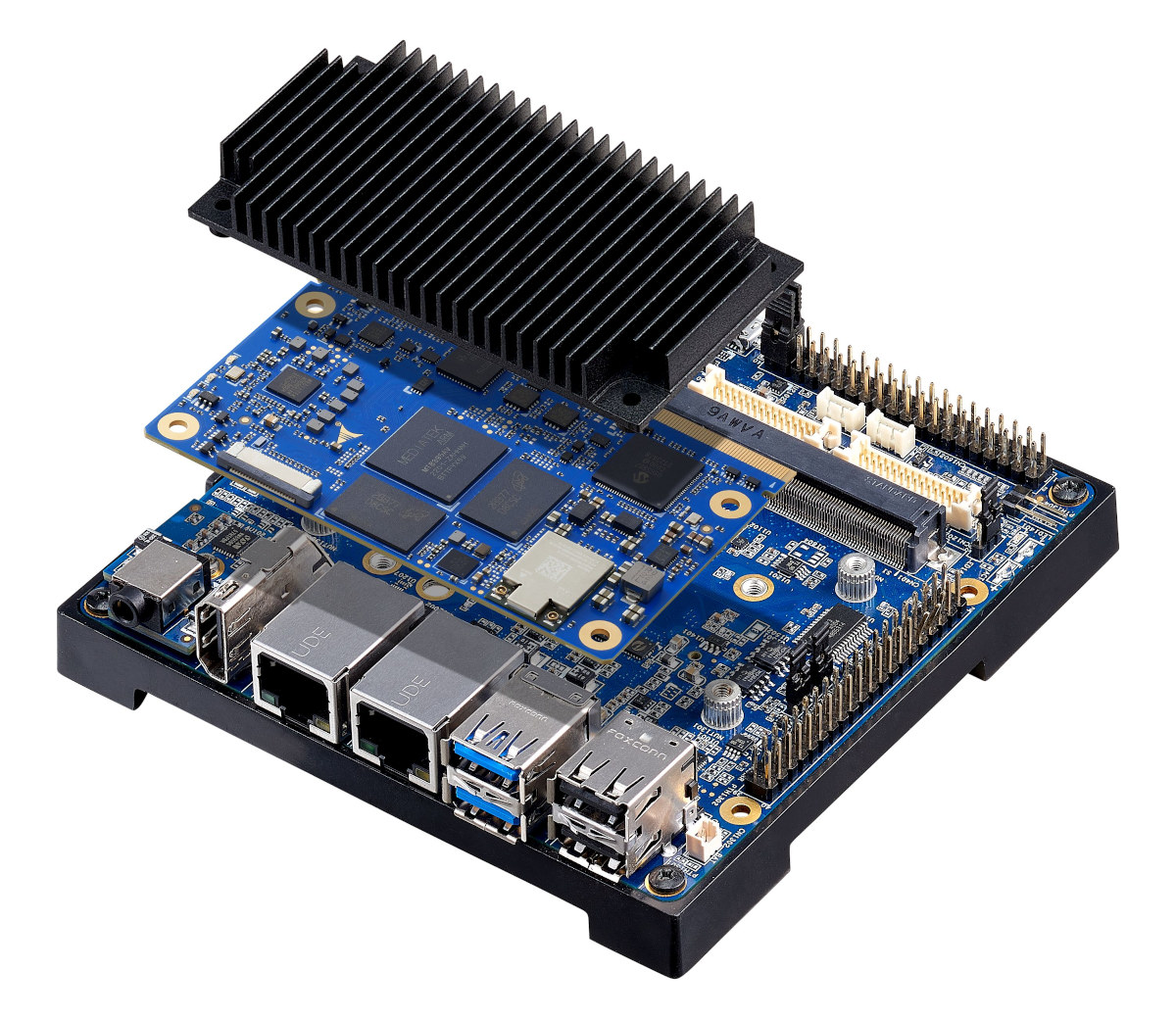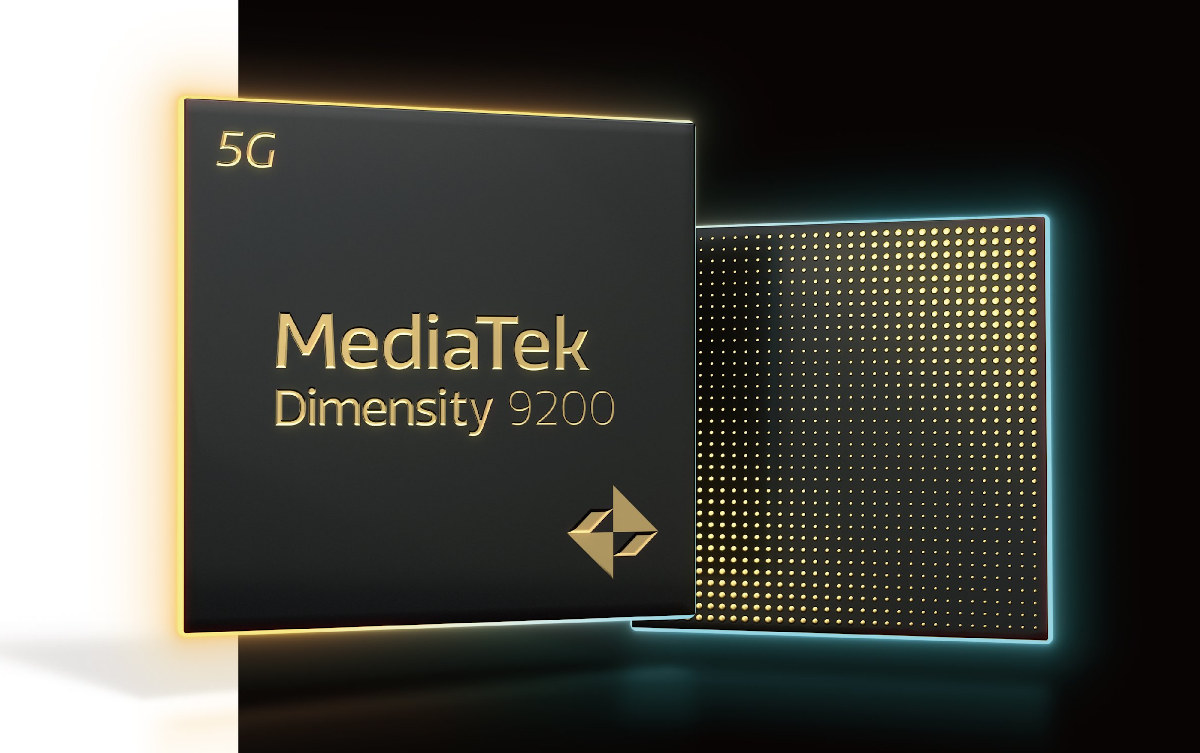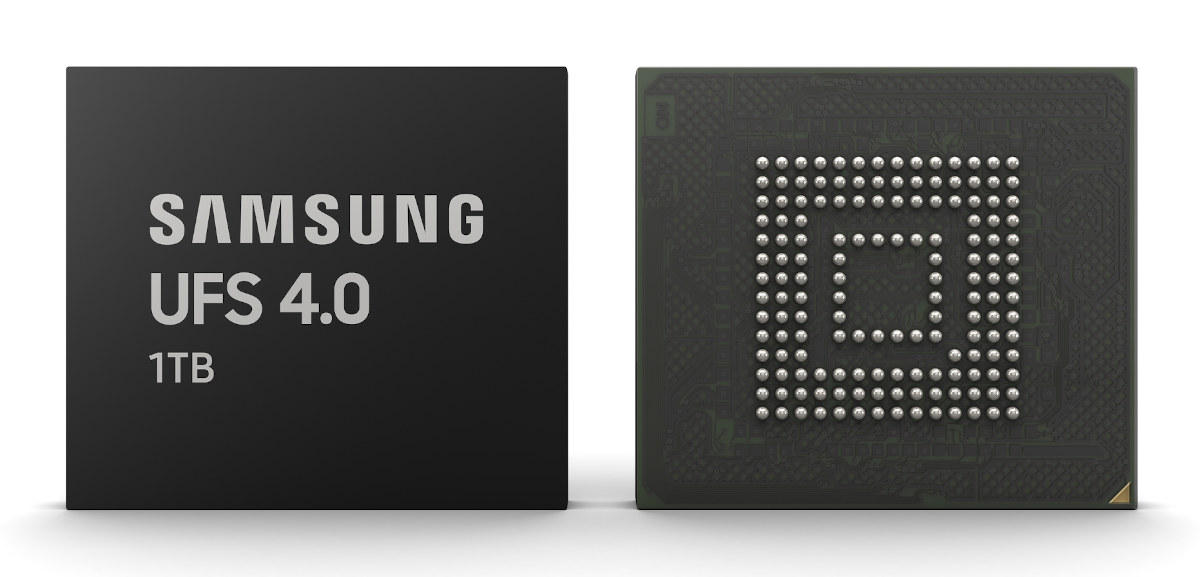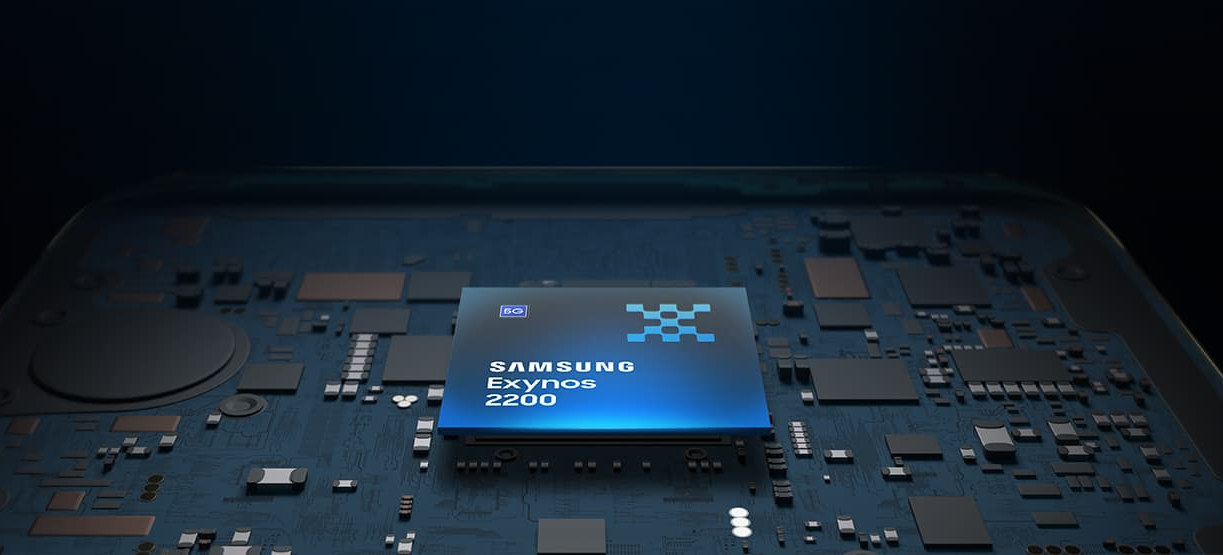Radxa NIO 12L is a low-profile single board computer (SBC) based on the MediaTek Genio 1200 octa-core Cortex-A78/A55 SoC with a 4 TOPS NPU that got Ubuntu certification with at least 5 years of software update, and up to 10 years for extra payment. The board comes with up to 16GB RAM, 512GB UFS storage, HDMI, USB-C (DisplayPort), and MIPI DSI video interfaces, a 4K-capable HDMI input port, two MIPI CSI camera interfaces, gigabit Ethernet and WiFi 6 connectivity, five USB ports, and a 40-pin GPIO header for expansion. Radxa NIO 12L specifications: SoC – Mediatek Genio 1200 (MT8395) CPU Quad-core Arm Cortex-A78 @ up to 2.2 to 2.4GHz Quad-core Arm Cortex-A55 @ up to 2.0GHz GPU Arm Mali-G57 MC5 GPU with support for OpenGL ES1.1, ES2.0, and ES3.2, OpenCL 1.1, 1.2 and 2.2, Vulkan 1.1 and 1.2 2D image acceleration module APU – Dual‑core AI Processor Unit (APU) Cadence […]
Sophgo SG2380 – A 2.5 GHz 16-core SiFive P670 RISC-V processor with a 20 TOPS AI accelerator
Sophgo SG2380 is an upcoming 2.5 GHz 16-core RISC-V processor based on SiFive Performance P670 cores and also equipped with a 20 TOPS AI accelerator using SiFive Intelligence X280 and Sophgo TPU that will find its way into a $120 desktop-class mini-ITX motherboard in H2 2024. The RISC-V processor also supports up to 64GB RAM, as well as UFS 3.2 and SATA 3.0 storage, comes with an Imagination GPU for 3D graphics and a VPU capable of 4Kp60 H.265, H.264, AV1, and VP9 video decoding, plenty of interfaces, and the system can manage locally deployed larger-scale LLMs like LLaMA-65B without the need for external NVIDIA or AMD accelerator cards. Sophgo SG2380 RISC-V SoC Sophgo SG2380 specifications: CPU 16-core SiFive P670 (RV64GCVH) 64-bit RISC-V processor @ up to 2.5GHz with RISC-V Vector v1.0, Vector Crypto Cluster configuration – 12x 2.5 GHz performance cores, 4x 1.6 GHz efficiency cores Full RISC-V RVA22 […]
Linux 6.4 release – Main changes, Arm, RISC-V and MIPS architectures
Linux 6.4 has just been released by Linus Torvalds on the Linux Kernel Mailing List (LKML): Hmm. Final week of 6.4 is done, and we’ve mainly got some netfilter fixes, some mm reverts, and a few tracing updates. There’s random small changes elsewhere: the usual architecture noise, a number of selftest updates, some filesystem fixes (btrfs, ksmb), etc. Most of the stuff in my mailbox the last week has been about upcoming things for 6.5, and I already have 15 pull requests pending. I appreciate all you proactive people. But that’s for tomorrow. Today we’re all busy build-testing the newest kernel release, and checking that it’s all good. Right? Released around two months ago, Linux 6.3 brought us AMD’s “automatic IBRS” Spectre defense mechanism, additional progress on the Rust front with User-mode Linux support (on x86-64 systems only), the NFS filesystem (both the client and server sides) gained support for […]
A first look at i-Pi SMARC 1200 (Genio 1200) development kit
ADLINK Technology’s i-PI SMARC 1200 is an industrial prototyping kit for AI IoT and Robotics based on a SMARC 2.1 compliant LEC-MTK-I12000 system-on-module (SoM) powered by the MediaTek Genio 1200 (MT8395) octa-core Cortex-A78/A55 AIoT processor with a 4.8 TOPS AI processor. The company sent me a sample for evaluation and review, and in this first post, I’ll go through an unboxing and how to boot the system with the supported Yocto Linux or Ubuntu. i-Pi SMARC 1200 unboxing The i-Pi SMARC 1200 may be destined for industrial users, but it still comes with a neat retail package. The “i-Pi LEC-MTK-I1200-44-64G/EU” kit features a CPU module with 4GB LPDDR4 memory and 64GB UFS storage. The package includes the board itself preassembled in a desktop frame, a Quick Start Guide, a 19V/2.37A (45W) power adapter with an EU power cord, a micro USB to USB cable for debugging, and two bits for […]
MediaTek Genio 1200 system-on-module powers Cortex-A78/A55 AIoT & robotics development kit
ADLINK Technology’s SMARC 2.1 compliant LEC-MTK-I12000 system-on-module (SoM) features the MediaTek Genio 1200 octa-core Cortex-A78/A55 AIoT processor coupled with up to 8GB RAM and 256GB UFS storage, and powers the I-Pi SMARC 1200 development kit designed for robotics and AIoT applications. LEC-MTK-I1200 MediaTek Genio 1200 system-on-module LEC-MTK-I1200 SoM specifications: SoC – MediaTek Genio 1200 (MT8395) octa-core processor with 4x Cortex-A78 cores @ 2.2GHz, 4x Cortex-A55 cores @ 2.0GHz with penta-core Arm Mali-G57 GPU @ 880MHz with support for OpenGL ES 3.2/2.0/1.1, Vulkan 1.1/1.0, OpenCL 2.2, 5.0 TOPS NPU, HiFi 4 audio DSP, etc… System Memory – 4 or 8 GB LPDDR4X Storage – 32, 64, 128, or 256 GB UFS storage, compatible with UFS gear 2.1 Wireless – 802.11b/g/n/ac WiFi 5 2×2 MU-MIMO, Bluetooth 5.0 314-pin MXM connector with Storage – 1x SDIO (4-bit) compatible with SD/SDIO standard, up to version 3.0 Display HDMI 2.0b up to 4Kp60 Dual-channel LVDS […]
MediaTek unveils Dimensity 9200 Octa-core Cortex-X3/A710/A510 5G mobile processor
MediaTek has just launched the Dimensity 9200 octa-core flagship 5G mobile processor with one Cortex-X3 core, two Cortex-A710 cores, and four Cortex-A510 cores, as well as the latest Arm Immortalis-G715 GPU. Manufactured for a TSMC 4nm processor for efficiency, the new flagship processor supports mmWave 5G and sub-6GHz cellular connectivity, LPDDR5x 8,533 Mbps memory, UFS 4.0 storage, and embeds a faster MediaTek APU 690 AI processor MediaTek Dimensity 9200 specifications: Octa-core CPU subsystem 1x Arm Cortex-X3 core at up to 3.05 GHz 3x Arm Cortex-A710 cores at up to 2.85 GHz 4x Arm Cortex-A510 cores up to 1.80GHz 8MB L3 cache 6MB system cache GPU – Arm Immortalis-G715 with support for Vulkan 1.3, hardware-based ray tracing engine AI Accelerator – MediaTek APU 690 AI processor with MDLA (MediaTek Deep Learning Accelerator), MVPU (MediaTek Vision Processing Unit), SME (I don’t know what that is), and DMA Memory I/F – LPDRR5x 8,533 […]
Samsung UFS 4.0 storage to offer up to 4,200 MB/s read speeds, 1TB capacity
Samsung Electronics has unveiled its first Universal Flash Storage (UFS) 4.0 solution based on the company’s 7th-generation V-NAND and a proprietary controller allowing speeds of up to 23.2 gigabits per second (Gbps) per lane or double the previous UFS 3.1 solutions. In more practical terms, Samsung UFS 4.0 storage will deliver a sequential read speed of up to 4,200 MB/s and a sequential write speed of 2,800 MB/s, corresponding to about 2x and 1.6x faster speeds over UFS 3.1 storage. Samsung also claims that power efficiency has been enhanced with a sequential read speed of up to 6.0 MB/s per milliampere (mA), or about a 46-percent improvement over UFS 3.1. An advanced Replay Protected Memory Block (RPMB) is integrated into the chip to store important personal data that can only be read or written through authenticated access, and whose design is said to be 1.8 times more efficient. Samsung UFS […]
Samsung Exynos 2200 SoC features Xclipse 920 GPU with AMD RDNA 2 architecture
Samsung has just unveiled the Exynos 2200 Armv9 SoC equipped with Samsung Xplipse 920 GPU based on AMD RDNA architecture and promising console quality graphics on mobile devices. Manufactured with a 4nm process, the octa-core processor also features Arm Cortex-X2, Cortex-A710, and Cortex-A510 cores, a 5G modem for up to 7.35 Gbps downlink, 8K video encoding and decoding, as well as support for LPDDR5 memory and UFS 3.1 storage. Exynos 2200 specifications: CPU 1x Arm Cortex-X2 3x Arm Cortex-A710 4x Arm Cortex-A510 GPU – Samsung Xclipse 920 GPU built with AMD RDNA 2 technology enabling hardware-accelerated ray tracing (RT) and variable rate shading (VRS), a first on mobile according to Samsung VPU Video decode – 8Kp60 10-bit HEVC (H.265), 8Kp30 10-bit VP9, AV1 Video encode – 8Kp30 10-bit HEVC(H.265), VP9 AI – AI Engine with Dual-core NPU and DSP up to 52 TOPS (TBC) Memory – LPDDR5 Storage – UFS […]


